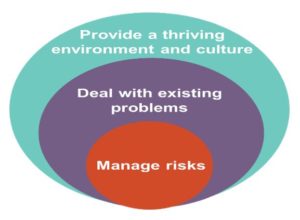Clare Forshaw, Occupational Health & Hygiene Partner, at Park Health & Safety Partnership asks, in uncertain times why are we still trying to ‘sell’ the business benefits of health & wellbeing?

Clare Forshaw
‘Health’ in the workplace is a broad topic – covering not only physical, chemical, biological and psychological risks created by work but also other risk related issues such as fitness for task, fatigue and ageing as well as issues related to lifestyle choices and improving health and wellness.
Health is often assumed by employers to sit within the realm of ‘health professionals’ with the skills and training to diagnose, treat and respect medical in confidence information. However, the ownership of risks to health created by the workplace sits firmly with the employers themselves. There is no trade off between where an organisation should place its effort and resources when it comes to the health of the workforce. The answer is simple and prescribed by law; Identify, control and manage the risks you create!
There are obviously levels of intervention when it comes to protecting, promoting and improving health outcomes for our workforce – all of which should be based on the strong foundation of PREVENTING harm arising from work activities.
There is a plethora of evidence proving that ‘good work’ benefits individuals, business performance and impact on wider society and has a positive impact on the economy (Waddell & Burton 2006, Black 2008, Taylor 2017, Stevenson & Farmer 2017, DH&SC 2018). There are also emerging and growing implications for investing in the future health status of our workforce including an increasingly aged workforce, skills shortages, and attracting and retaining high calibre recruits.
So, in uncertain times why are we still trying to convince employers to direct resources into preventative, sustainable solutions in favour of ‘quick win’ tick box wellbeing initiatives?
The problem sits partly with the inherent ambition to get more ‘bang for your buck’! Many truly effective risk management solutions for health take time and effort to explore, appreciate, embed and evaluate. In comparison to a short-term wellbeing campaign this can seem onerous and the benefits unquantifiable.

Another significant barrier lies in a fixed perspective of employers with regards to their liability. I’m sure many health and safety professionals are familiar with the response; ‘is it caused by work?’, ‘is it my responsibility?’ along the lines of do I have to do something. Yet, with the increasing blurring of work and personal life; and subsequently work and personal exposure and risk factors affecting health outcomes, this simple bimodal perspective is out of date and unhelpful. A more pertinent phrase which need to be adopted is ‘work relevant’. Particularly with conditions around mental and musculoskeletal health – which are multifactorial, with complex causality and varying symptoms. Employers could more helpfully consider the impact of these conditions on work capacity; individuals in the workplace; and their potential to be kept functional and effective for the business.
We know that an increasing number of organisations really get this, and their health programmes are helping them become better – with higher productivity they act as employment magnets for people who like being treated well at work. But there are still many misconceptions and barriers to understanding health in the workplace and for effective strategic approaches to be fully embedded. Yet in these uncertain times there is also a great opportunity to reconsider our perspectives on responsibility for the health of our workers. We can set a new direction to engage with workers and other key professions in the workplace to assure a healthier future for our workers and our businesses.
Clare was speaking at the 10th British Safety Council Annual Conference in November.
References
What makes us susceptible to burnout?
In this episode of the Safety & Health Podcast, ‘Burnout, stress and being human’, Heather Beach is joined by Stacy Thomson to discuss burnout, perfectionism and how to deal with burnout as an individual, as management and as an organisation.
We provide an insight on how to tackle burnout and why mental health is such a taboo subject, particularly in the workplace.



